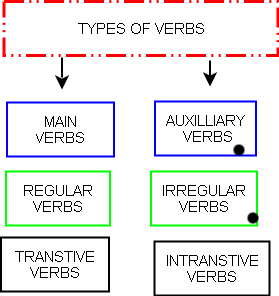Types of verbs: Main and auxiliary verbs.
Contents
Main and auxilliary verbs
Introduction
Welcome to the course on verbs! The course consits of three modules.You will be learning a lot of things about verbs and their uses in these modules.The first module will be treating different types of verbs. The first unit of this module will teach you what verbs are. The unit will also teach you two types of verbs,namely, main and auxilliary verbs.
At the end of this lesson you will be able to:
|
Lesson Content
Definition of verbs
Verbs are the words you use to get others to perform some actions or carry out some activities and vice versa. You use verbs too to describe to others what you are doing and vice versa.One can say that verbs are the vihicle or means by which a language is transmitted from one person to others. They are therefore called "action words" or "doing words". Can you list five action words in you language? I believe that you can.In this unit we will be learning about main and auxilliary verbs in English language.We will define each of them and make sentences with each to illustrate its use.
Types of verbs
Verbs are of different types according to their forms and functionsin sentences.The following are the main verb types in English language.
- Main or lexical verbs
- Auxilliary verbs
- Finite and non-finite verbs
- Transitive and intransitive verbs
- Active and passive verbs
- Regular and irregular verbs
Main verbs
Main verbs are those verbs that can stand on their own in sentences. They do not need the help of another verb to make a sentence meaningful. A main verb directly tells you what the subject of a sentence does. Main verbs are also called lexical verbs.They can be in present or past tense forms. Here are some examples: cook, see,love,eat etc.Can you name some other examples of lexical verbs in English? Can you make sentences with these verbs? Here are some examples of sentences made with the above lexical verbs.The underlined words are lexical verbs.Each lexical verb tells us what the subject of each sentence does/do or did.
Activity
- List five lexical verbs
- Make a sentence with each of them
Auxilliary verbs
These are verbs that are used with other verbs to make meaningful sentences. They are also called helping verbs. Here are some examples:be will,shall,may,can,has,have etc. Here are some examples of sentences made with the above auxilliary verbs.The auxilliary verbs are underlined.
Note: The following verbs are often used as auxilliary verbs:
- forms of the verb be eg am,is,are,be,being,been,was,were.
- forms of haveeg. have,has,had.
- forms of doeg. do, does,did.
- the verbs-can,could,may,might,shall,should,will,would,must,ought to,used to.
Activity
Make a sentence with each of these words: may,can,has,should,haveought to.
| In this unit you learnt what verbs are and their functions as vehicle for communication.. You also learnt the names of different types of verbs. The unit described two of these verbs ,namely,main and auxilliary verbs and how these could be used in sentences.You will learn more about other types of verbs in the next unit. I hope you have enjoyed this lesson |
|
1. State the difference between lexical and auxilliary verbs. 2.Read the text below. Underline the main verbs and circle the auxilliary verbs. Eze was checking through the carton of empty bottles which had been returned from Mrs. Madu's shop when he found a paper bag which had slipped between the wrinkled flap and side of the carton.He took it out,and to his surprise, he found it contained a thick bundle of bank notes of a high denomination,totaling nearly twenty thousand naira.The money was large enough to enable Eze start a business he had been wanting to set up.The temptation to take the money was strong. But Eze, was someone who would not take what did not belong to him. He did what he considered was the right thing by returning the money to Mrs. Madu. Mrs.Madu who had been serching all over her store for the missing money was very grateful to Eze. To show her appreciation to Eze, she gave him five thousand naira. |

